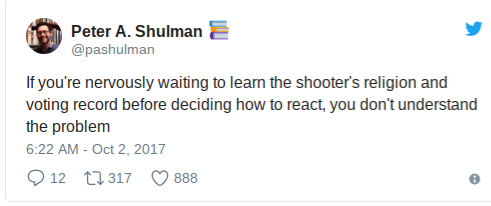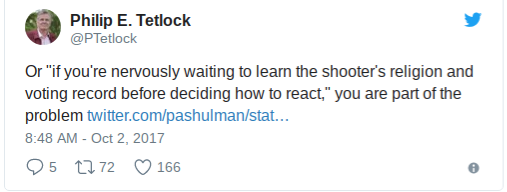In modern America, every mass murder has two essential characteristics.
First, the number murdered.
Second, the group identity of the murderer.
And not necessarily in that order. Whenever a mass murder pops up in the news, many viewers hasten to find out whodunit – where “whodunit” isn’t a person, but an affiliation. Is the murderer a Muslim? A non-Muslim who used a gun? A Democrat? Republican? Or just a lone nut who wasn’t a “gun nut”?
Depraved Reaction?
On the surface, this seems like a depraved reaction to human suffering. After the October 1 Last Vegas shooting, Historian Peter Shulman remarked:

And the great Phil Tetlock responded:

On reflection, though, whodunit is tremendously important. Why? Because in our society, the routine reaction to mass murder is to try to punish millions of innocent people. If the murderer is a Muslim, the public want to punish millions of peaceful Muslims by depriving them of the right to visit or live in the U.S. If the murderer is a non-Muslim who used a gun, the public want to punish millions of innocent gun-owners by making it harder for them to buy and sell firearms. If the murderer is a Democrat, Republicans try to paint millions of innocent Democrats as sympathizers. If the murderer is a Republican, Democrats try to paint millions of innocent Republicans as sympathizers. Even if the murderer is apolitical and didn’t use a gun, many want to punish innocent disturbed people by easing standards for involuntary psychiatric commitment.
Collective Punishment Is Inherently Illiberal
As I wrote the last paragraph, I could already hear the voices in your head saying, “Innocent members of group X? Don’t make me laugh!” and “Innocent members of group X? Well, too bad for them.” Maybe, but let’s think it through. If you accept the slogan, “Guns don’t kill; people do,” what’s wrong with the slogan, “Islam doesn’t kill; people do”? If you respond, “Guns don’t kill; people with guns do,” what’s wrong with, “Islam doesn’t kill; people inspired by Islam do”? The parallels are clear, no?
You could respond, “Collective punishment isn’t fair, but it works.” But I almost never hear anyone say such things. Why not? Because dehumanizing the enemy is important for political victory, and activists want victory. And in any case, the moral objections to collective punishment are so compelling most people would rather dodge them than confront them.
In a just society, mass murderers’ group identity wouldn’t matter. Suicidal murderers would escape punishment, as they always do. The rest would be tried and punished like any other criminal. But sadly, our society refuses to hew to the path of justice. If a mass murderer cheats the hangman, we’re still out for blood. Whose blood? Well, whodunit? Let’s get them.
As usual, I greatly sympathize with Tetlock’s perspective. What kind of a person hears about a mass murder and says, “Whew! At least the perp is on the other side”? (Or even “Heh heh. This could be our big chance!”) But the fundamental vice isn’t basing your reaction on the identity of the murderer. After all, some collective punishments are likely to be worse than others. The fundamental vice is support for collective punishment itself.
This article was originally published at Library of Economics and Liberty. H/t to Fee.org.
TGIF: Liberty Requires Nationwide Injunctions
The government is always a threat. This we must never forget. In that light, I want to examine the recent U.S. Supreme Court ruling in Trump v. CASA, the 6-3 decision that sided with the Trump administration's position that a federal district court exceeded its...







